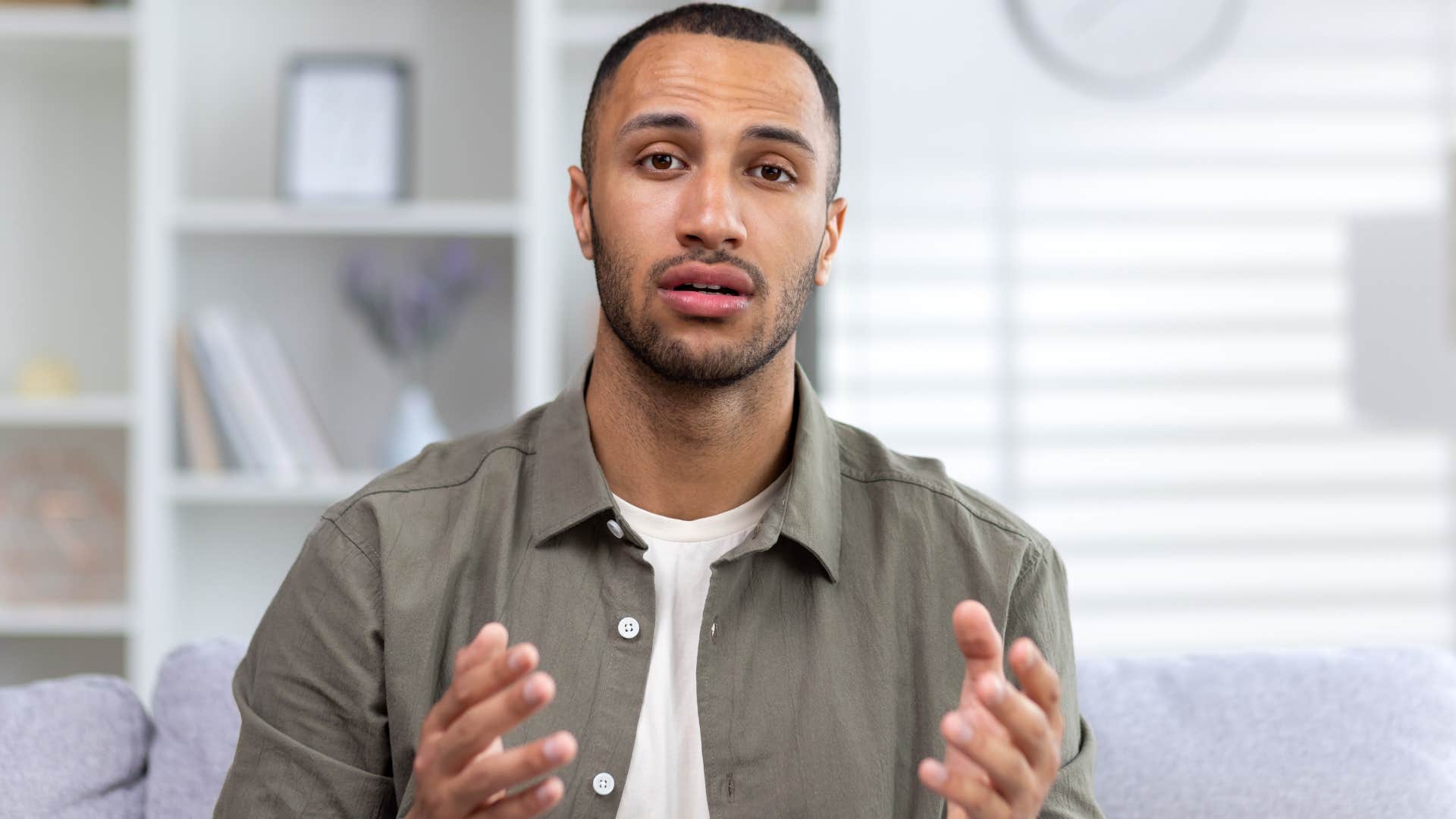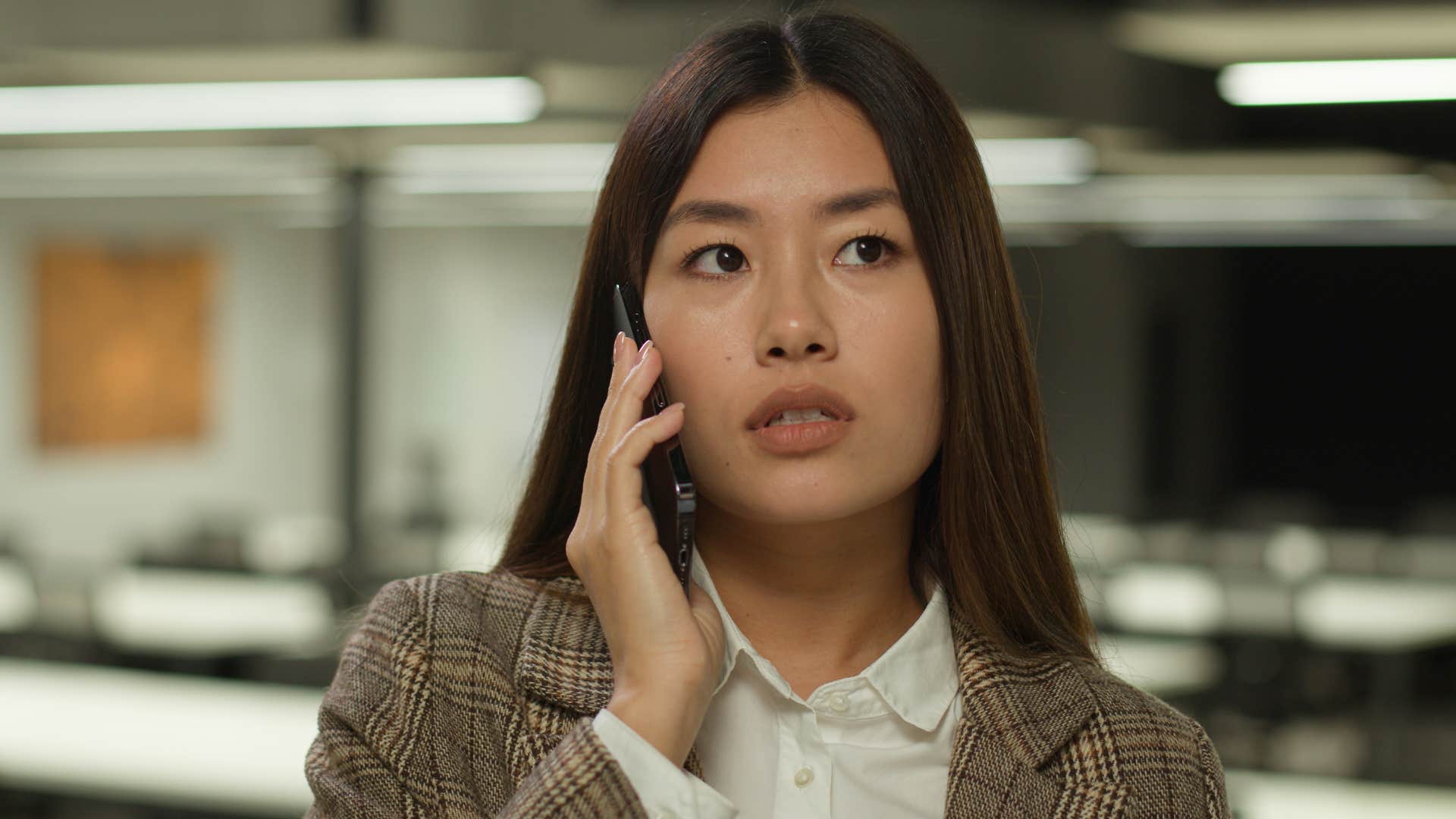People Can Tell You Don't Like Them If You Say These 11 Things Too Often
It's obvious that you're looking for an excuse to walk away.
 Look Studio | Shutterstock
Look Studio | Shutterstock While there are several unsuspecting body language signals and nonverbal cues that reveal someone doesn’t like you, from avoiding eye contact to offering up a fake smile, sometimes the words that come out of their mouth are a whole lot more telling. When we don’t like someone, it’s possible to put on a show for the sake of productivity or surface-level comfort, but people can tell you don’t like them if you say these things too often.
Whether it’s a question like “Can we do this another time?” or a subtle phrase like “That’s interesting,” our deep internal emotions and discomfort often arise when we talk to someone that we just don’t like. Of course, it’s uniquely personal — it’s possible to like someone, even if they don’t have a “bad” personality or display manipulative traits. Sometimes, we just don’t mesh well with people, and that’s not the end of the world.
People can tell you don’t like them if you say these 11 things too often
1. ‘That’s interesting’
 Prostock-studio | Shutterstock
Prostock-studio | Shutterstock
According to a study from Personality and Social Psychology Bulletin, people who give vague answers or are clearly disinterested in conversations are often perceived as less likable.
However, those disinterested cues in a conversation can also be a sign that someone isn’t vibing with or feeling comfortable with others — they don’t care enough about showing interest or crafting a strong foundation of knowledge to build a future relationship.
“That’s interesting” is a perfect example of that — they’re putting on a show and showing a vague interest for the sake of interpersonal comfort, but don’t actually care enough to ask thoughtful questions or follow up.
2. ‘Whatever’
 Diego Cervo | Shutterstock
Diego Cervo | Shutterstock
We often experience a “liking gap” in conversations with others, where we’re actually liked more by the people we’re interacting with than we believe we are internally. We don’t give ourselves enough credit — letting overthinking tendencies and deep-rooted insecurities discourage us from believing that we’re likable, even after a casual conversation.
However, sometimes people can tell you don’t like them when you say things like “whatever,” especially in a certain disinterested tone of voice and with negative body language. In these circumstances, we might actually be right about reading verbal cues from others and offering poor nonverbal cues to others, even if we’re trying to be polite.
3. ‘Must be nice’
 Estrada Anton | Shutterstock
Estrada Anton | Shutterstock
While other people may show genuine support for others, ask thoughtful follow-up questions, and pose a kind of interest when someone’s speaking to them, a passive-aggressive person is often characterized by their “inaction,” at least according to a study from Frontiers in Psychology.
They use phrases like “whatever” or “I’m fine” to stop a conversation in its tracks, whether it’s because they don’t like someone or are triggering their own insecurities by being in a conversation with them.
Of course, passive-aggressiveness is often rooted in complex internal emotions like resentment, embarrassment, and insecurity that can appear in any kind of relationship, from an intimate partner to a person you just met on the street.
4. ‘If you say so’
 GaudiLab | Shutterstock
GaudiLab | Shutterstock
Without putting in the effort to truly understand where someone’s coming from or asking questions to clear up misunderstandings, a person who doesn’t like you will probably say something like “if you say so” when they don’t agree.
You’ve probably experienced this yourself — rather than leaning into a conversation with someone you don’t like or agree with, you use these one-liners to get out of the interaction unscathed. While interacting with people who have different experiences, opinions, and thoughts can prompt personal growth and insight, sometimes these conversations do more harm than good.
5. ‘I’m just joking’
 Gorgev | Shutterstock
Gorgev | Shutterstock
In all kinds of relationships, shared laughter can often be a sign of relationship satisfaction, well-being, and closeness, according to a study from Personal Relationships.
However, if your humor style and preferences don’t align with others — like your self-deprecating jokes being taken offensively by others or their crude humor being annoying to you — chances are you’re not laughing when they’re around.
People can tell you don’t like them by the lack of laughter in response to their jokes, in general, but with phrases like “What’s the joke?” or “I’m just joking,” it’s made exceptionally clear.
6. ‘No offense’
 GaudiLab | Shutterstock
GaudiLab | Shutterstock
“No offense” is often a way for people to disguise their disinterest or hurtful comments with passivity. It allows people to say whatever they want, without worrying about being liked or even taking accountability for saying it.
People can tell you don’t like them if you’re always using a phrase like “no offense” as a preamble to conversations. It not only comes across as arrogant and rude, but also distasteful and offensive.
7. ‘I’m sure’
 Branislav Nenin | Shutterstock
Branislav Nenin | Shutterstock
If someone’s telling you something, sharing their knowledge, or even trying to persuade you on a specific topic, and you respond with “I’m sure,” chances are they’re going to know you’re not interested right away.
When you like someone, even if they’re telling you something you already know or annoying you a bit with their delivery in a conversation, you feign excitement or ask follow-up questions. If you don’t like someone, it’s always disengage body language and a one-liner meant to separate you from the conversation — something like, “sure.”
8. ‘Uh huh’
 Dean Drobot | Shutterstock
Dean Drobot | Shutterstock
While verbal cues like “uh-huh” are sometimes healthily used when someone’s actively listening to you, alongside nonverbal behaviors like nodding their head or making eye contact, people can often tell you don’t like them when you’re only responding or contributing to a conversation with this phrase.
Not only is it disengaged — you’re not offering any kind of response other than a subtle sound and gesture — it’s often disrespectful. It’s okay to not like someone or to even walk away from an interaction, but to give someone half your attention and to waste their time with a disengaged conversation only sabotages both of your well-being.
9. ‘That’s just how I am’
 Krakenimages.com | Shutterstock
Krakenimages.com | Shutterstock
Especially around someone they don’t want to build a relationship or connection with, a person using a phrase like “that’s just how I am” evades accountability or room for a deeper conversation.
If they don’t like someone, they’re not going to spend time justifying their decisions or actively listening to someone who’s not adding value to their lives, so instead, it’s a phrase like “that’s just how I am” that fills the space.
For professionals, managing unhealthy and disengaged conversations is a skill that often requires more interest or intention, but if you’re caught in a conversation with a stranger you don’t like in public, you don’t owe them time or attention if they’re harming you on any level.
10. ‘I’m fine’
 TetianaKtv | Shutterstock
TetianaKtv | Shutterstock
While withholding vulnerability and emotional connection from a loved one in your life can be toxic and disconnecting, at least according to clinical psychologist Randi Gunther, you don’t owe this level of depth to someone you don’t like or trust.
If someone is begging for an ounce of attention or trying to seek out your emotional qualms, but you don’t want to share, it’s perfectly acceptable to use a phrase like “I’m fine” or even plainly, “no.” People can tell you don’t like them if you say these things too often, but sometimes, to protect our own peace, they’re necessary.
11. ‘Can we not do this right now?’
 MAYA LAB | Shutterstock
MAYA LAB | Shutterstock
Conversations rarely ever end when people expect or even want them to, according to a study from Trends in Cognitive Sciences, but that doesn’t mean you have to stick around with someone you don’t like to protect the peace.
If you don’t like someone or are actually being harmed by the conversation, you don’t have to stick it out — you always have the choice to set a boundary, end a conversation, or simply walk away.
So if you use a phrase like “Can we not do this right now?” or “I’m not interested in having a conversation,” chances are a person will realize you don’t like them, but for your sake, that might be better than an unproductive, unhealthy conversation.
Zayda Slabbekoorn is a senior editorial strategist with a bachelor’s degree in social relations & policy and gender studies who focuses on psychology, relationships, self-help, and human interest stories.

